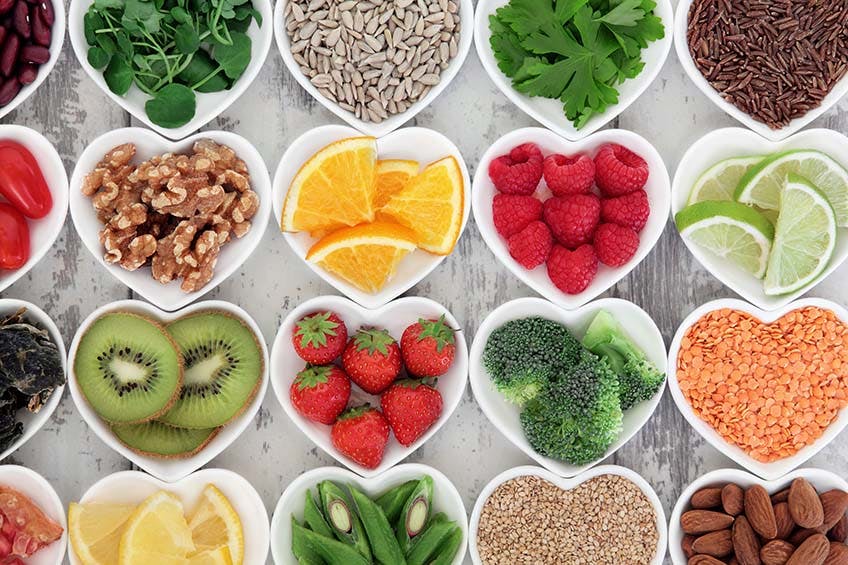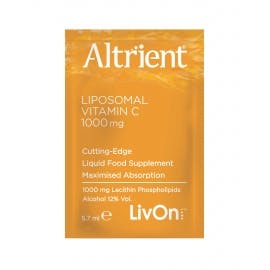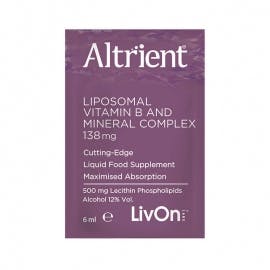Was your Christmas a Heart Health Risk? Liposomal Vitamin C and B Complex could be the solution...
Be honest, did you go mad on the mince pies, festive chocolates and sausage rolls? If you did, you may need the help of liposomal B complex and liposomal vitamin C to help counter the negative effects.
Cholesterol and plaque build up
Coronary artery disease (CAD) is the leading cause of death worldwide. This inflammatory condition tends to start with cholesterol deposition within the artery walls and a subsequent build up of plaque which is mostly made up of fat, cholesterol, collagen and inflammatory cells. Over time the plaque can calcify and harden, which narrows the arteries restricting blood flow to the heart. When plaques rupture, the injury initiates an inflammatory response mechanism and this increases the risk of thrombosis, high blood pressure and heart failure.
Vitamin C for strengthening artery walls
Vitamin C plays an essential role in repairing the cardiovascular system. This vitamin is important for the synthesis of collagen, in fact a deficiency of vitamin C means a deficiency in collagen. Collagen comes in different forms, its type III collagen which forms connective tissues that give shape and strength to the heart and arteries and type IV collagen is needed to repair blood vessels. Aside for collagen support vitamin C also has powerful antioxidant properties that are known to inhibit fat oxidation, thereby reducing the risk of atherosclerosis.
Homocysteine and risk factors
There are many factors such as smoking, obesity, diabetes, lack of exercise, raised cholesterol and high blood pressure that affect your risk of heart disease, but it is largely due to poor nutrition and lifestyle. Raised homocysteine is now also considered to be a major risk factor for CAD. Homocysteine is a natural derivative of protein that has pro-oxidant as opposed to antioxidant properties. Not only does it increase clotting factors but it also increases toxins that damage arteries and increase inflammation
Liposomal B vitamins and homocysteine
Liposomal Altrient B contains B6, B12 and a patented form of folate called quatrefolic which is highly absorbable, all of which are crucial for driving homocysteine metabolism, lowering homocysteine and reducing the risk cardiovascular disease. Poor absorption or a dietary insufficiency of these nutrients can lead to high levels of homocysteine and an increased risk of heart disease.
The importance of liposomal Altrient supplements
Altrient’s high-performance liposomal supplements, vitamin C and B complex offer even further heart-healthy benefits. This is down to the clever use of phospholipid rich encapsulation, which includes a high percentage of phosphatidylcholine (PC). Research suggests that supplementing with PC lowers homocysteine levels and consequently may reduce risk of heart disease.
Fat facts and food swaps
Saturated fats are thought to increase inflammation and raise cholesterol deposits in the arteries. Recent research has identified that certain types of saturated fats such as those found in red meat rather than dairy products, may increase your risk of CAD. The risk can be significantly lowered by replacing saturated fats (red meat and dairy) for polyunsaturated fats, found in salmon, fresh tuna, mackerel, flax seeds and walnuts, which have anti-inflammatory and heart protective properties.
Go-to nutrition tips for a healthy heart
Achieving a healthy diet requires more than just taking supplements of course. Phytochemicals and trace elements found in plant foods are essential for optimal cardiovascular health. You can give your heart a fresh start by losing weight, stopping smoking, reducing stress and taking up regular exercise. The British Heart Foundation maintain that people who exercise regularly are half as likely to get cardiovascular disease. Nutrition is important too, here are some valuable dietary suggestions:
Soluble fibre - helps maintain healthy cholesterol levels. Flax seeds and oats are good sources of this type of fibre.
Increase antioxidants – found in colourful fruits, berries and vegetables, are important for helping to maintain healthy blood flow and cholesterol levels.
Garlic and beetroot - garlic helps support healthy blood pressure and cholesterol levels and beetroot increases levels of nitric oxide, a substance that allows blood vessels to dilate, improving blood flow and keeping blood pressure down.
Oily fish, nuts and seeds - a good source of omega 3 essential fatty acids (EFAs). Studies show that EFAs support healthy arteries, blood flow, normal heart rhythm and cholesterol levels.
Jacqueline S Newson BSc (Hons) Nutritional Therapy
References
American College of Cardiology. Understanding coronary artery disease. https://www.cardiosmart.org/News-and-Events/2016/06/Understanding-CAD. [accessed 29.11.18]
Brink EJ, Katan MB, Olthof MR and Verhoef P. Choline supplemented as phosphatidylcholine decreases fasting and postmethionine-loading plasma homocysteine concentrations in healthy men, The American Journal of Clinical Nutrition, 2005; 82, 1: 111–117.
Brouwer IA, Geleijnse JM, Hornstra G and Nettleton JA. Saturated Fat Consumption and Risk of Coronary Heart Disease and Ischemic Stroke: A Science Update. Ann Nutr Metab. 2017;70(1):26-33.
Clarke R, Halsey J, Lewington S et al. Effects of lowering Homocysteine levesl with B vitamins on cardiovascular disease, cancer and cause-specific mortality: meta-analysis of 8 randomized trials involvolving 37,485 individuals. Arch Intern Med. 2010; 170 (18): 1622-1631.
Cuenca E, Domínguez R, Maté-Muñoz JL, et al. Effects of Beetroot Juice Supplementation on Cardiorespiratory Endurance in Athletes. A Systematic Review. Nutrients. 2017;9(1):43.
Damy T, Kirsch M, Khouzami L, et al. Glutathione deficiency in cardiac patients is related to the functional status and structural cardiac abnormalities. PLoS One. 2009;4(3):e4871.
https://www.thrombosisadviser.com/coronary-and-peripheral-artery-disease/. [accessed 29.11.18.]
Jacobsen DW. Homocysteine and vitamins in cardiovascular disease. Clinical Chemistry 1998; 44 (8) 1833-1843.
Jones PJH and Wollin SD. α-Lipoic Acid and Cardiovascular Disease, The Journal of Nutrition 2003; 133, 11, 1: 3327–3330.
Malhotra A, Meier P and Redberg RF. Saturated fat does not clog the arteries: coronary heart disease is a chronic inflammatory condition, the risk of which can be effectively reduced from healthy lifestyle interventions. Br J Sports Med 2017;51:1111-1112.
Sudheendran S, Chang CC, Deckelbaum RJ. N-3 vs. saturated fatty acids: effects on the arterial wall. Prostaglandins Leukot Essent Fatty Acids. 2010;82(4-6):205-9.
The collagen connection. https://nutritionreview.org/2013/04/collagen-connection/ [accessed 10.12.18.]



.jpg?auto=format&q=45&w=262&trim=auto)
.jpg?auto=format&q=45&w=262&trim=auto)
